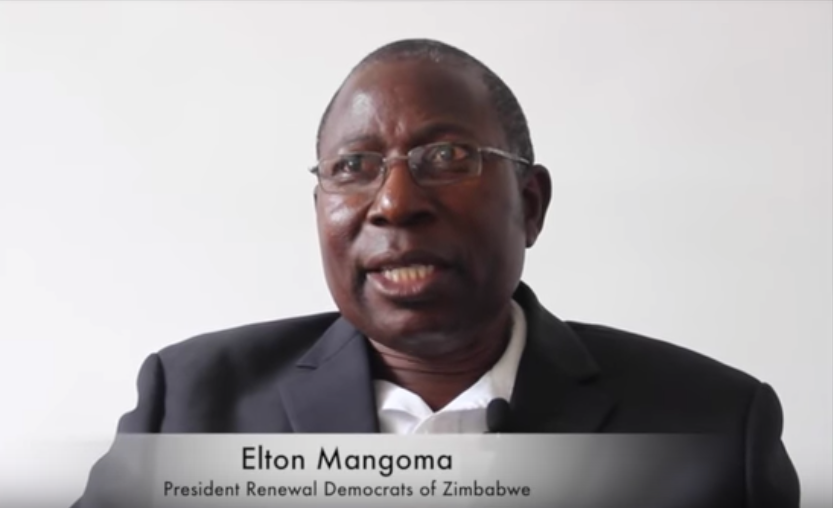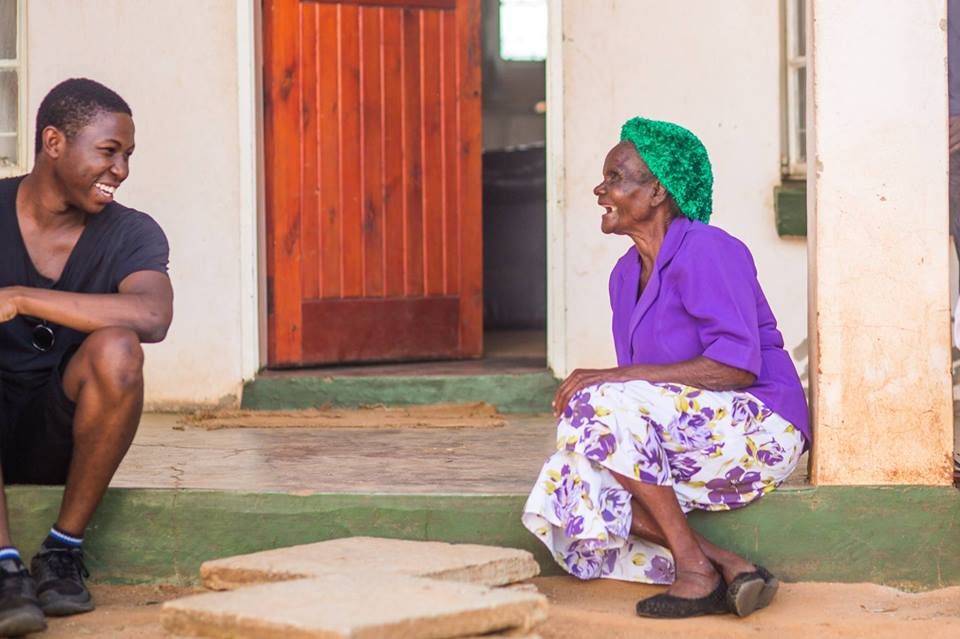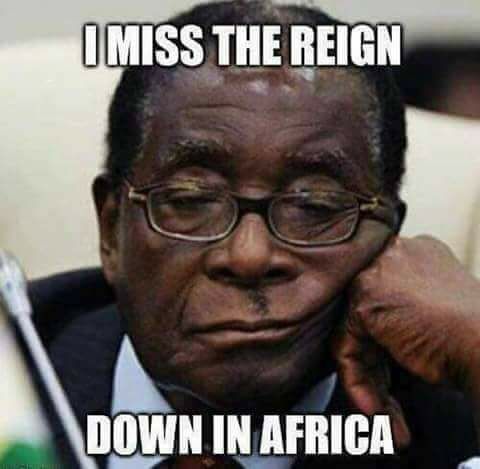

Share
24th November 2017
02:52pm GMT

 Source; 263/YouTube
"It was then I found out my father had been abducted a week and a half before, he was being tortured and no one told me anything.
"My dad and I never talked about politics, I think he wanted to protect me, so we usually just talked about football.
"I went home to my family the day I found out and I'll never forget this; my dad was sitting there on a chair, so chilled, just eating corn.
"His leg was in a cast and he looked up at me and the first thing he wanted to know was if I caught the Arsenal match last weekend, because he had missed the results.
"That night it just hit me. How serious this was, how dangerous, how likely it was that my dad would die for politics."
https://twitter.com/SoccerMemes/status/933107770957713408
Elton Mangoma was abducted in 2008, right before the presidential elections that were due to be held. As a senior member of a rival party to Mugabe, Mangoma was in danger.
"The first time I heard my dad swear, I was 5 years old," says Kuda.
"'This is fucking bullshit,' he said. We were driving and all the cars had to pull to the side of the road because Mugabe’s motorcade was coming. Every time he left his house it caused traffic carnage.
"My earliest memory of Mugabe is from 1998 when I started primary school. All government buildings in Zim ( Zimbabwe) have to have a portrait of Mugabe in every room.
"I remember staring up at him every single day of every primary school year. That same portrait is the one being torn down all over the country right now."
https://twitter.com/WellenceMujuru/status/933289666928939008
Mugabe had led the country for 37 years at the time of his enforced resignation, but he was not always the authoritarian villain he became.
Robert Mugabe was once one of Africa's most respected nationalists and played a prominent role in Zimbabwe’s struggle for independence from British colonial rule.
But the economic policies of the ex-president have crippled the country and the chasm between the wealthy few and the struggling many is wide in Zimbabwe. In 2008, Zimbabwe suffered the second most severe episode of hyperinflation in recorded history.
More than 3 million Zimbabweans live in extreme poverty, inflation is in triple digits, the local currency lost 99% of its value and more than a quarter of its citizens have fled.
"The inequality and corruption in the Zimbabwe is rife, it's devastating," states Mangoma. "All of our infrastructure and state services have been stripped by Mugabe and his dons.
"People struggle everyday to get food - let alone nutritious food. They struggle to pay school fees and battle each day of uncertainty - whilst a privileged few continue to loot the system.
"People within the capital die from curable diseases, they die from typhoid. The healthcare system has no money. Mugabe would fly to Singapore for all of his medical appointments. While the average life expectancy in Zimbabwe is 60 years, he is 93 years old."
Mugabe's rule was brutal and frequently violated his citizens' human rights but his official orders were always issued according to the constitution, by passing laws.
When the government instituted the brutal Murambatsvina operation in 2005, which left nearly 700,000 homeless, it was done legally following a parliamentary debate.
Murambatsvina literally translates to 'getting rid of the filth' and a scathing UN report on the operation, which the government dubbed a 'clean-up', brought Zimbabwe's domestic policies into the international spotlight.
The day to day law and order of Zimbabwe is left to the police force, who are notoriously under-resourced and corrupt.
"Most of the police don’t even have cars, only bicycles. My friend caught a guy robbing his house, so he had to hit him with a frying pan, tie the guy to a chair, drive to the police station, pick up a cop, bring the cop to his house to arrest the guy, and then drive them both back to the police station.
"My friend said it was the most awkward car journey ever. I laughed so hard when he told me the story.
"The only way we survived so many years of shit was through gallows humour. Getting rid of Mugabe doesn't change all of this. But it brings the biggest opportunity for change."
Mugabe lost the 2008 presidential elections but refused to relinquish power to an opposition leader; he used the Zimbabwean national army to violently quash the support of his rivals.
The former president swore that "only God" could remove him from office, but in the end it was his own army, who feared that Mugabe was paving the way for his wife Grace to become president, who removed him.
"I woke up four hours after it was announced that Mugabe had resigned, I saw a message from one of my old friends saying he was gone, that was at 6.50am and by 6.53am, I was blaring the loudest music dancing around my room with the Zim flag around my shoulders.
"I’m not even religious but I could fully feel all my ancestors dancing with me. As a kid it was a day I always imagined, I thought I would be with my friends and family but it was just me, my housemate and my cat."
Source; 263/YouTube
"It was then I found out my father had been abducted a week and a half before, he was being tortured and no one told me anything.
"My dad and I never talked about politics, I think he wanted to protect me, so we usually just talked about football.
"I went home to my family the day I found out and I'll never forget this; my dad was sitting there on a chair, so chilled, just eating corn.
"His leg was in a cast and he looked up at me and the first thing he wanted to know was if I caught the Arsenal match last weekend, because he had missed the results.
"That night it just hit me. How serious this was, how dangerous, how likely it was that my dad would die for politics."
https://twitter.com/SoccerMemes/status/933107770957713408
Elton Mangoma was abducted in 2008, right before the presidential elections that were due to be held. As a senior member of a rival party to Mugabe, Mangoma was in danger.
"The first time I heard my dad swear, I was 5 years old," says Kuda.
"'This is fucking bullshit,' he said. We were driving and all the cars had to pull to the side of the road because Mugabe’s motorcade was coming. Every time he left his house it caused traffic carnage.
"My earliest memory of Mugabe is from 1998 when I started primary school. All government buildings in Zim ( Zimbabwe) have to have a portrait of Mugabe in every room.
"I remember staring up at him every single day of every primary school year. That same portrait is the one being torn down all over the country right now."
https://twitter.com/WellenceMujuru/status/933289666928939008
Mugabe had led the country for 37 years at the time of his enforced resignation, but he was not always the authoritarian villain he became.
Robert Mugabe was once one of Africa's most respected nationalists and played a prominent role in Zimbabwe’s struggle for independence from British colonial rule.
But the economic policies of the ex-president have crippled the country and the chasm between the wealthy few and the struggling many is wide in Zimbabwe. In 2008, Zimbabwe suffered the second most severe episode of hyperinflation in recorded history.
More than 3 million Zimbabweans live in extreme poverty, inflation is in triple digits, the local currency lost 99% of its value and more than a quarter of its citizens have fled.
"The inequality and corruption in the Zimbabwe is rife, it's devastating," states Mangoma. "All of our infrastructure and state services have been stripped by Mugabe and his dons.
"People struggle everyday to get food - let alone nutritious food. They struggle to pay school fees and battle each day of uncertainty - whilst a privileged few continue to loot the system.
"People within the capital die from curable diseases, they die from typhoid. The healthcare system has no money. Mugabe would fly to Singapore for all of his medical appointments. While the average life expectancy in Zimbabwe is 60 years, he is 93 years old."
Mugabe's rule was brutal and frequently violated his citizens' human rights but his official orders were always issued according to the constitution, by passing laws.
When the government instituted the brutal Murambatsvina operation in 2005, which left nearly 700,000 homeless, it was done legally following a parliamentary debate.
Murambatsvina literally translates to 'getting rid of the filth' and a scathing UN report on the operation, which the government dubbed a 'clean-up', brought Zimbabwe's domestic policies into the international spotlight.
The day to day law and order of Zimbabwe is left to the police force, who are notoriously under-resourced and corrupt.
"Most of the police don’t even have cars, only bicycles. My friend caught a guy robbing his house, so he had to hit him with a frying pan, tie the guy to a chair, drive to the police station, pick up a cop, bring the cop to his house to arrest the guy, and then drive them both back to the police station.
"My friend said it was the most awkward car journey ever. I laughed so hard when he told me the story.
"The only way we survived so many years of shit was through gallows humour. Getting rid of Mugabe doesn't change all of this. But it brings the biggest opportunity for change."
Mugabe lost the 2008 presidential elections but refused to relinquish power to an opposition leader; he used the Zimbabwean national army to violently quash the support of his rivals.
The former president swore that "only God" could remove him from office, but in the end it was his own army, who feared that Mugabe was paving the way for his wife Grace to become president, who removed him.
"I woke up four hours after it was announced that Mugabe had resigned, I saw a message from one of my old friends saying he was gone, that was at 6.50am and by 6.53am, I was blaring the loudest music dancing around my room with the Zim flag around my shoulders.
"I’m not even religious but I could fully feel all my ancestors dancing with me. As a kid it was a day I always imagined, I thought I would be with my friends and family but it was just me, my housemate and my cat."
 Kuda and his Grandmother in Zimbabwe.
"I have so much FOMO not being at home right now. I keep seeing photos and videos of people dancing in the street and having ice-cream parties. Zimbabweans love ice-cream, it's just so pure.
"I live in Australia right now and when people in here would ask me how he was still leader, it was so hard to explain, how a 93--year-old senile man was still running the country into the ground.
"Zimbabwe is so different, people are passive. I mean they took a break during the coup so Mugabe could have high tea with his top generals, the same ones who were responsible for his house arrest and go to a university graduation.
"Zim has ten universities and Mugabe made himself chancellor of all ten of them, so even though he was under arrest, he still had commitments they let him meet.
"There’s a saying in Zim that, 'it’s the land where the possible and the impossible meet'. Some things that are so outrageous and bizarre but because they actually happen in our country we just accept it.
"Ever since the army came on TV on Sunday evening, to say this 'wasn't a coup', but the military was taking charge, social media has been a rollercoaster of jokes, memes, theories and anxiety, a continuous cycle that stretched from Wednesday 'til Sunday.
Kuda and his Grandmother in Zimbabwe.
"I have so much FOMO not being at home right now. I keep seeing photos and videos of people dancing in the street and having ice-cream parties. Zimbabweans love ice-cream, it's just so pure.
"I live in Australia right now and when people in here would ask me how he was still leader, it was so hard to explain, how a 93--year-old senile man was still running the country into the ground.
"Zimbabwe is so different, people are passive. I mean they took a break during the coup so Mugabe could have high tea with his top generals, the same ones who were responsible for his house arrest and go to a university graduation.
"Zim has ten universities and Mugabe made himself chancellor of all ten of them, so even though he was under arrest, he still had commitments they let him meet.
"There’s a saying in Zim that, 'it’s the land where the possible and the impossible meet'. Some things that are so outrageous and bizarre but because they actually happen in our country we just accept it.
"Ever since the army came on TV on Sunday evening, to say this 'wasn't a coup', but the military was taking charge, social media has been a rollercoaster of jokes, memes, theories and anxiety, a continuous cycle that stretched from Wednesday 'til Sunday.
 "Press in Zimbabwe is all government-controlled and so social media and international outlets is where most real ‘news’ comes from.
"In the days after the TV announcement there were protests on the streets of Zim, they were historic because doing the same actions a week before would've been incredibly dangerous and illegal.
"To see people who have been oppressed and broken for decades finally able to express how they feel was a volcano of emotion.
"It was also historic because no matter the race, religion and political affiliation of the people in the streets, they were united by the fact that Zimbabwe needed Mugabe gone and needed reform.
"Zimbabweans have felt this way for decades. I think the looney decisions Mugabe made in the final weeks/months of his presidency were enough to build more momentum - especially online. People didn't feel free to speak publicly in the streets (as it was illegal), so online expression grew.
https://twitter.com/SMukalenge/status/932234706753609728
"People are celebrating like mad right now and that is dope, but soon we're going to wake up and then it will be a time for a lot of hard reflection. The fear is that very little will change for the majority of the country.
"The fear for me stems from the fact that Mnangagwa, the man taking over, has been Mugabe's protégé of sorts since the 70s.
https://twitter.com/ali_naka/status/933624320055808002
"I am skeptical that he will change his ways. But still cautiously optimistic that real, lasting change can come if electoral reform is allowed."
Kuda naturally is supporting his father's bid for presidency.
Elton Mangoma is the Coalition of Democrats (CODE) nominee for president of Zimbabwe and is currently campaigning at a grassroots level in the run-up to the next presidential elections, set to be held in 2018.
But Kuda won't be the only Zimbabwean who believes there needs to be even greater change than the removal of a nonagenarian president.
"We have lost a tyrant, but the tyranny remains and arguably has been strengthened by a new face."
"Press in Zimbabwe is all government-controlled and so social media and international outlets is where most real ‘news’ comes from.
"In the days after the TV announcement there were protests on the streets of Zim, they were historic because doing the same actions a week before would've been incredibly dangerous and illegal.
"To see people who have been oppressed and broken for decades finally able to express how they feel was a volcano of emotion.
"It was also historic because no matter the race, religion and political affiliation of the people in the streets, they were united by the fact that Zimbabwe needed Mugabe gone and needed reform.
"Zimbabweans have felt this way for decades. I think the looney decisions Mugabe made in the final weeks/months of his presidency were enough to build more momentum - especially online. People didn't feel free to speak publicly in the streets (as it was illegal), so online expression grew.
https://twitter.com/SMukalenge/status/932234706753609728
"People are celebrating like mad right now and that is dope, but soon we're going to wake up and then it will be a time for a lot of hard reflection. The fear is that very little will change for the majority of the country.
"The fear for me stems from the fact that Mnangagwa, the man taking over, has been Mugabe's protégé of sorts since the 70s.
https://twitter.com/ali_naka/status/933624320055808002
"I am skeptical that he will change his ways. But still cautiously optimistic that real, lasting change can come if electoral reform is allowed."
Kuda naturally is supporting his father's bid for presidency.
Elton Mangoma is the Coalition of Democrats (CODE) nominee for president of Zimbabwe and is currently campaigning at a grassroots level in the run-up to the next presidential elections, set to be held in 2018.
But Kuda won't be the only Zimbabwean who believes there needs to be even greater change than the removal of a nonagenarian president.
"We have lost a tyrant, but the tyranny remains and arguably has been strengthened by a new face."
Life Style | Joe.ie
life style